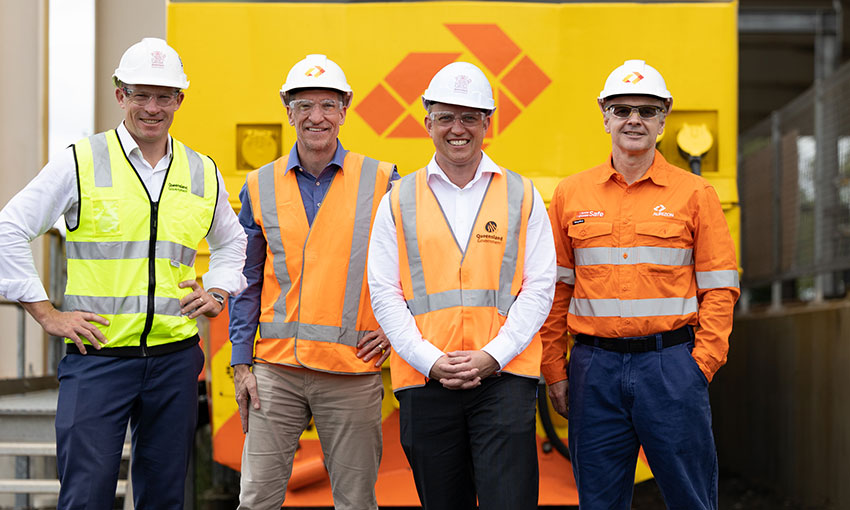RAIL freight operator Aurizon and mining company Anglo American are working together on a feasibility study to assess the introduction of hydrogen-powered trains for bulk freight.
Aurizon and Anglo American have entered into an agreement to conduct the feasibility study that will explore the application of Anglo American’s proprietary hydrogen fuel cell and battery hybrid power units in heavy haul freight rail operations.
If the feasibility study is successful, the agreement between the two companies could be extended to further phases of collaboration, which could include detailed engineering and the development of a hydrogen fuelled heavy haul locomotive prototype.
Queensland Deputy Premier and state development minister Steven Miles said the feasibility study would explore whether hydrogen fuel cell and battery hybrid power units could be used in heavy haul freight rail operations.
“The feasibility study will focus on the potential deployment of Anglo American’s hydrogen power technology on Aurizon’s Moura rail corridor and also the Mount Isa Rail corridor,” Mr Miles said.
“The Moura corridor operates between Anglo American’s Dawson metallurgical coal mine and the Gladstone Port, and the Mount Isa rail corridor operates between the North West Minerals Province to Townsville Port, via Aurizon’s Stuart Terminal.
“The announcement is more proof that Queensland is committed to capturing every section of the renewable energy value chain.”
As part of its commitment to carbon-neutral mines by 2040, Anglo American has worked to develop green hydrogen systems for its ultra-class 290-tonne payload mine haul trucking fleet.
According to Anglo American, its combination of powertrain technologies, designed to operate safely and effectively in real-world mine conditions, will displace the use of the majority of diesel at its mining operations, with an advanced trial of the prototype truck at its Mogalakwena platinum group metals mine in South Africa.
Aurizon aims to reach net-zero operational emissions by 2050. The company also has begun research and development for battery-powered trains with several industry parties and Australian universities.
Aurizon managing director and CEO Andrew Harding said hydrogen offers enormous opportunity in decarbonising and continuing to improve the competitiveness of Australia’s export supply chains.
“This is especially true for bulk products underpinning the Australian economy including minerals, agricultural products and fertilisers, industrials and general freight,” Mr Harding said.
“Zero-carbon hydrogen-powered trains would also significantly boost the current environmental benefits of transporting more of Australia’s bulk freight on rail. Rail freight already produces up to 16 times less carbon pollution per tonne kilometre than road.
“Aurizon is excited to be teaming up with Anglo American on this project, particularly given their success to date in developing unique technology solutions for use in mine haul fleets.”
Anglo American CEO in Australia Tyler Mitchelson said Anglo American has committed to carbon neutral operations by 2040, and it is aiming to reduce our Scope 3 emissions by 50% in the same timeframe.
“We know that we cannot achieve all of this alone, so we are working with partners along our value chains and outside our industry to find technical solutions to decarbonise,” Mr Mitchelson said.
“This collaboration with Aurizon is a great example of the power of partnerships to help address the urgent issue of climate change, while we also look to catalyse new markets to support the development and growth of the hydrogen economy.”
Anglo American technical director Tony O’Neill said the agreement with Aurizon marks the first time Anglo American’s hydrogen power technology could be tested beyond its existing mine haul truck program.
“Displacing our use of diesel is critical to eliminating emissions at our sites and along our value chain. We believe that our innovative hydrogen-led technology provides a versatile solution, whether for trucks or trains or other forms of heavy-duty transport,” he said.
State minister for energy, renewables and hydrogen Mick de Brenni said the project showed yet again the way renewable energy and the burgeoning hydrogen industry meant more jobs in more industries for more Queenslanders.
“Projects like this are important because they enable domestic demand and create an ecosystem for green hydrogen,” Mr de Brenni said.
“Transport accounts for 14% of emissions and is the fastest growing sector for emissions. However, we recognise that transport can lead the emissions reduction push if we move quickly with initiatives like this one.





